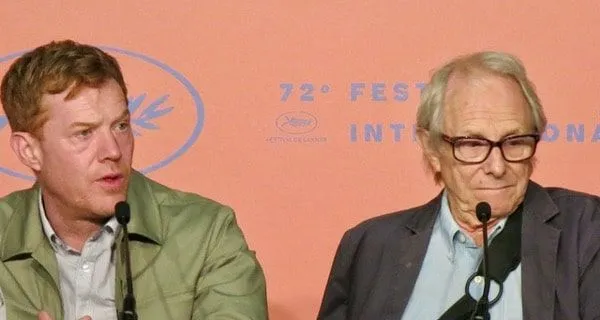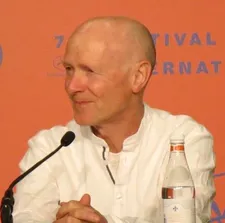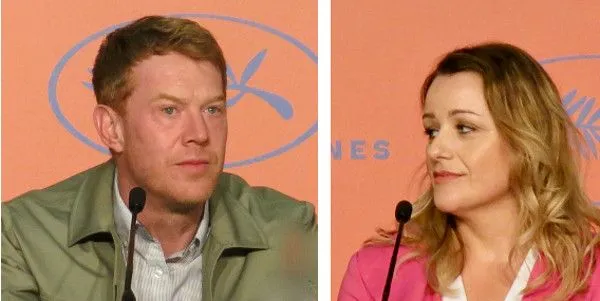 |
| Actor Kris Hitchen and director Ken Loach at the Cannes Film Festival for the world premiere of Sorry We Missed You Photo: Richard Mowe |
When Ken Loach decided to tackle the inequalities of the gig economy, in which temporary, flexible jobs are commonplace and companies tend toward hiring independent contractors and freelancers instead of full-time employees, he found Newcastle provided the perfect setting for Sorry We Missed You.
He had worked there previously on his Palme d'Or winning I, Daniel Blake and empathised with the city’s strong character. He told today’s media gathering after the screening of his latest Cannes Competition entry that the city is “a little separate from the rest of the country”.
He added: “It has had a very strong tradition of struggle. The area has the old industries of coal mining and shipbuilding which have gone and it has been neglected with few new industries coming in. Most people struggle to meet ends meet like the characters in this one and the previous, I, Daniel Blake.
 |
| Screenwriter Paul Laverty: The reality now for millions is that work deprives us time with our loved ones' Photo: Richard Mowe |
Loach recalled that when he was a young man, contemporaries were told that if you had a skill or craft you would find a job for life and be able to bring up a family on the wage.
“The inexorable change from that security has been to the insecurity where people can be hired and fired at a day’s notice. This is where people are on contracts and where the employer makes no commitment to how much work they will get or how much they will earn.
"Much of the time they work through agencies. And the worker takes all the risk and the employer is in the fortunate position of taking no risk. The worker has to exploit himself or herself to survive. It is the perfect situation for the big companies - they have no risk and the worker has to run himself in to the ground. That is the inexorable change that has happened. It is not capitalism failing - it is capitalism working as it always will. We talked it through and Paul came up with the idea of how that would refract into family relationships. How that determines the choices families have and determines their relationships.”
Screenwriter Paul Laverty believes that inequality in society is now almost as important an issue as climate change.
He said: “Britain is now following same as the US, with extreme inequality. For Americans without a degree real wages have become stagnant or worse, and in the US in the last three years life expectancy has gone down, the first time this has happened in a century. And it is happening now in the UK as well. You see a massive concentration of wealth and massive exploitation. The whole idea of work is that you look after your family and the reality now for millions is that work deprives us time with our loved ones. It is bonkers but it is the logical consequence of the market.”
Debbie Honeywood, who plays the mother trying to keep the family together worked in education for 20 years and continued as a supply teacher. She landed the part after joining an extras agency. They sent out and advert for the Loach film and she decided to go for it.
She said: “I sent off a video of myself and the process went on from there with a meeting and a drink and that was it. I went through auditions and script readings and met the rest of the ‘family’ and we just bonded right away.”
Kris Hitchen, as her husband, met Loach first 18 years for his film on the railways, The Navigator. He said: “Unfortunately at that time it did not come to fruition. For this one, he had spread the search from Newcastle to Manchester and I went in, met him, and that was it.”
 |
| Kris Hitchen and Debbie Honeywood. Hitchen on getting the part in Sorry We Missed You: 'I went in, met him, and that was it' Photo: Richard Mowe |
























